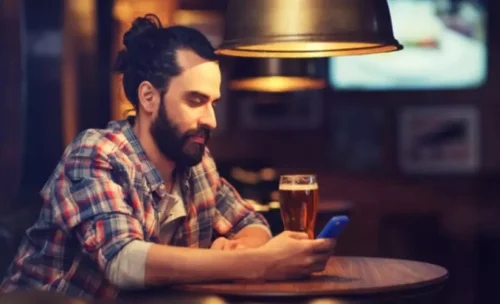
Around 20% of adult Americans use alcohol – known to be a powerful sleep inducer – to help them fall asleep. However, new research shows that while alcohol may bring on sleepiness, it can disrupt sleep and, over time, cause insomnia by interfering with the body’s system for regulating sleep. Dr. Richard Stephens at Keele University explains that low blood sugar can make the after-effects of drinking alcohol worse.

How alcohol can affect sleep quality: 6 symptoms
His research and clinical practice focuses on the entire myriad of sleep disorders. The researchers carried out a series of experiments with mice and rats to study what happens to adenosine in the brain when alcohol is present. The level of adenosine outside of cells goes up during prolonged periods of wakefulness and goes down again during sleep. When the extracellular adenosine level goes up, it blocks the wake-promoting cells in the basal forebrain. When it goes down again, the block is lifted, and the wake-promoting cells become active. Our state-specific resource guides offer a comprehensive overview of drug and alcohol addiction treatment options available in your area.
Dr. Abhinav Singh,
During sleep, a person’s heart rate should slow and drop to below 60 beats per minute. A racing heart may disrupt sleep or cause someone to fully awaken. Alcohol causes a higher production of the stress hormone cortisol, which regulates the body’s stress response and initiates wakefulness. Disruptions to this hormone can lead to reduced quality sleep and cognitive difficulties. Alcohol can lead to fragmented sleep and waking up during the night, as it disrupts the sleep cycle.
Is it ever okay to have alcohol before bed?
Falling asleep and getting a full night’s rest are real problems that need to be managed effectively to maintain sobriety. Thankfully, sleeping without alcohol is an achievable goal if you follow several recommended strategies. At the beginning of the NREM cycle, within seconds to just a few minutes after nodding off, alpha and theta brain waves cause eye movement to slow down. This is a stage of light sleep where the individual can be easily woken. Having dinner with friends first and then planning to hit the bar? Have a few glasses of wine at dinner, and nurse a drink or two at the bar.
- Develop a bedtime routine that signals to your body it’s time to wind down.
- Unfortunately, despite the drowsiness, alcohol isn’t a good sleep aid.
- It also leads to lighter, more restless sleep as the night wears on, diminished sleep quality, and next-day fatigue.
- You could also consider Pedialyte, a nutrient-rich option that will hydrate and isn’t full of sugar like other sports drinks.
- So while cutting out drinking will likely benefit your sleep, there may be other factors affecting your shuteye.
- Based on data from roughly 160,000 Sleep Foundation profiles, nearly 90% of respondents who regularly consume alcohol in the evening have reported at least one sleep-related problem.
How to sleep better after drinking alcohol
Circadian rhythms regulate nearly all of the body’s processes, from metabolism and immunity to energy, sleep, and sexual drive, cognitive functions, and mood. Thus, if a person goes to sleep earlier than usual, the resulting shift in sleep homeostasis may cause them to wake up in the middle of the night or very early in the morning. Researchers from the University does alcohol help you sleep of Missouri (MU) School of Medicine in Columbia, MO, report their findings in the journal Alcohol. They have been studying the relationship between alcohol consumption and sleep for over 5 years. When we looked at 1.95 million RISE users aged 24 and up, we found their sleep needs ranged from five hours to 11 hours 30 minutes.
People who consume alcohol may wake up during sleep and experience increased disruptions such as sleep apnea and snoring. It’s not because I don’t appreciate a glass of wine with a great meal, or a few beers on a hot summer evening. It’s because I know what alcohol can do to sleep and healthy circadian rhythms. If you are one of the nearly two thirds of Americans who drink alcohol, chances are, you’ve had a drink in the hours before bedtime.

Does this mean you need to abstain from drinking altogether? But part of a smart, sleep-friendly lifestyle is managing alcohol consumption so it doesn’t disrupt your sleep and circadian rhythms. The typical sleep cycle begins with three non-rapid eye movement (NREM) stages of sleep and ends with rapid eye movement (REM). During sleep, the body cycles through all of these stages every 90 to 120 minutes, with NREM sleep dominating the first part of the night and REM increasing during the second part of the night.
Ways to avoid alcohol causing sleepiness
Vivid dreams and nightmares — With alcohol in your system you’re more likely to have intense, colorful dreams and nightmares as you sleep patterns ebb and flow. You may or may not remember them, but they can be lucid or give you a feeling that you are half awake and half asleep. Your deep restful sleep tends to be more prevalent in the first few hours but decreases during the second half. Then REM (your dreaming sleep) follows as the night goes on. Alcohol significantly affects rapid eye movement (REM) sleep, a vital sleep stage for cognitive functions like memory consolidation, learning, and emotional regulation. Alcohol suppresses REM sleep, particularly during the first half of the night, reducing the amount of time you spend in this restorative sleep phase.
Make your bed welcoming for when you get home
Sleep disruptions from alcohol consumption can harm your overall health and well-being. Limit naps to no more than one hour and avoid napping late in the day. Consider simple tips for better sleep, from setting a sleep schedule to including physical activity in your daily routine.
Drinking Water Before Bed

Unfortunately, as we age, our post-alcohol sleep quality goes downhill quickly. If you drink, practice moderation and prioritize your health with strategies like staying hydrated and maintaining good sleep hygiene to minimize the negative effects on your sleep. Avoiding alcohol altogether is recommended for a truly restful and restorative night’s sleep. Though these suggestions may help you get through the night a bit more painlessly, they won’t reverse the impact alcohol has on sleep quality. The best way to protect sleep is to cut off your drinking earlier in the day or forgo drinking entirely. The majority of Americans report drinking alcoholic beverages, and as is the case with most things, enjoying alcohol in moderation shouldn’t lead to any ill effects for a healthy person.